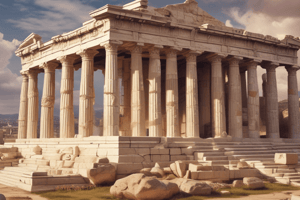Podcast
Questions and Answers
What type of government did Sparta have?
What type of government did Sparta have?
- Oligarchy (correct)
- Democratic
- Republic
- Monarchical
Which of the following best describes the economic system of Sparta?
Which of the following best describes the economic system of Sparta?
- Trade-based economy
- Agricultural economy
- Industrial economy
- Slave-based economy (correct)
Which aspect was highly valued in Athens that differentiated it from Sparta?
Which aspect was highly valued in Athens that differentiated it from Sparta?
- Loyalty to the state
- Poetry and Dance
- Military training
- Education (correct)
What form of religion did Spartans practice?
What form of religion did Spartans practice?
What was the primary focus of Athenian cultural development?
What was the primary focus of Athenian cultural development?
How many kings ruled simultaneously in Sparta?
How many kings ruled simultaneously in Sparta?
What significant feature of Sparta's environment served as a protection for its land and people?
What significant feature of Sparta's environment served as a protection for its land and people?
Which of the following was a primary god worshiped in Sparta?
Which of the following was a primary god worshiped in Sparta?
What was Socrates sentenced to death for?
What was Socrates sentenced to death for?
Which philosopher is known as the founder of medicine?
Which philosopher is known as the founder of medicine?
What is the main theme of Homer's works, the Iliad and the Odyssey?
What is the main theme of Homer's works, the Iliad and the Odyssey?
What was the purpose of the Delian League?
What was the purpose of the Delian League?
What military tactic is associated with the phalanx?
What military tactic is associated with the phalanx?
Which city-state was known for its democratic governance?
Which city-state was known for its democratic governance?
During which war did Athens and Sparta clash?
During which war did Athens and Sparta clash?
What philosophical approach is characterized by self-control over emotions?
What philosophical approach is characterized by self-control over emotions?
Who was the military king in Sparta during its dual monarchy?
Who was the military king in Sparta during its dual monarchy?
What did the Greeks typically share in terms of their cultural identity?
What did the Greeks typically share in terms of their cultural identity?
Flashcards
Sparta's Government
Sparta's Government
Sparta was an oligarchy, primarily ruled by the Spartan military. Two kings and a council of 28 members led the government.
Athens' Democracy
Athens' Democracy
Athens had a democratic system of government, but also had social classes and a patriarchal society.
Spartan Economy
Spartan Economy
Sparta's economy relied heavily on slave labor. They traded little with other city-states.
Athenian Economy
Athenian Economy
Signup and view all the flashcards
Sparta's Social Structure
Sparta's Social Structure
Signup and view all the flashcards
Athens' values
Athens' values
Signup and view all the flashcards
S.P.A.
S.P.A.
Signup and view all the flashcards
Athenian Environment
Athenian Environment
Signup and view all the flashcards
Socratic Method
Socratic Method
Signup and view all the flashcards
Hippocrates
Hippocrates
Signup and view all the flashcards
Delian League
Delian League
Signup and view all the flashcards
Peloponnesian War
Peloponnesian War
Signup and view all the flashcards
Phalanx
Phalanx
Signup and view all the flashcards
Hoplites
Hoplites
Signup and view all the flashcards
City-states
City-states
Signup and view all the flashcards
Athens
Athens
Signup and view all the flashcards
Sparta
Sparta
Signup and view all the flashcards
Hubris
Hubris
Signup and view all the flashcards
Study Notes
Ancient Greek City-States: Sparta
- Sparta: A city-state in Greece, prioritizing loyalty to the state
- Values: Poetry, dance, a strong military
- Environment: Natural fortress, land protection, agriculture
- Society/Government: Oligarchy, ruled primarily by the Spartan military, two kings simultaneously, 28 council members
- Economy: Slave-based, no trade with other city-states
- Religion: Polytheistic; primary gods include Zeus, Poseidon, Apollo
- Technology & Innovations: Weaponry (Kopis, Dora, swords, shields), passed down through generations
Ancient Greek City-States: Athens
- Athens: Capital of Greece, birthplace of Western civilization, emphasized education
- Government/Society: Democratic values, patriarchy, social hierarchy (upper, middle, lower classes, slaves)
- Cultural Development & Festivals: Valued education, emphasized democratic principles, and held festivals
Ancient Greek Society
- Greek Nation: City-states ruled individually, separately, but occasionally united for defense
- Monarchy: Ruled by two kings – one military, one political
- Military: Military alliances (e.g., Delian League) to protect themselves from Persia, Athenians turning against Pericles
- Society: Hoplites (soldiers), Helots (slaves), Epicureans (seeking joy), Skeptic philosophy (doubt), Stoic philosophy (self-control)
- Hellenistic Era: Ancient Greek domination, Alexander the Great, Peloponnesian War (Athens vs. Sparta)
- Cultural Development: Theaters, music, philosophy, trade, architecture, sculptures
- Economy: Trading, agriculture, lack of natural resources in some city-states required trade with other states for supplies
- Technology & Innovations: Modern mathematics, sculptures, architecture, the wheel for transportation
- Philosophers: Socrates, Plato, Aristotle, Hippocrates, and Herodotus
- Education: Socratic method, dialogues, and educational conversations, emphasis on historical analysis
Studying That Suits You
Use AI to generate personalized quizzes and flashcards to suit your learning preferences.
Related Documents
Description
Explore the contrasting city-states of Sparta and Athens in ancient Greece. This quiz covers their unique societal structures, values, government systems, and cultural practices. Test your understanding of how these city-states shaped Western civilization.




